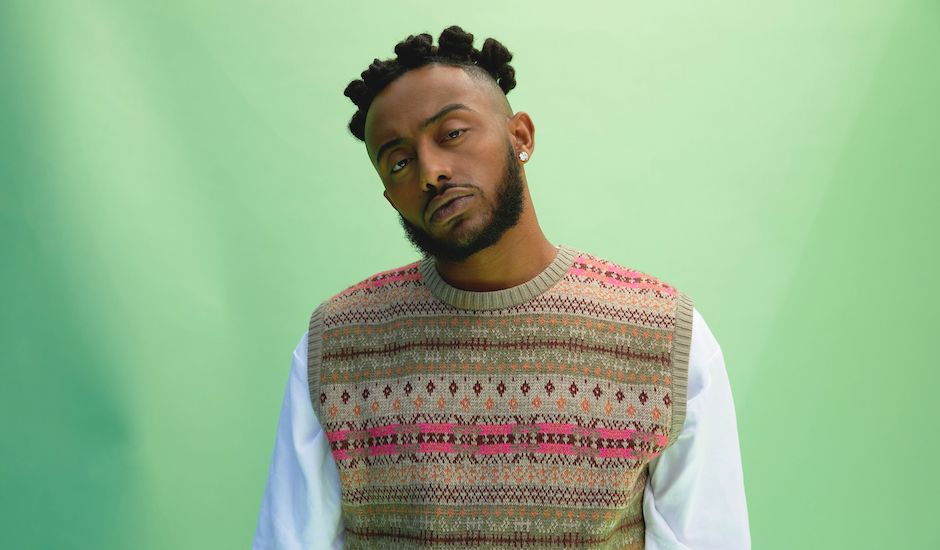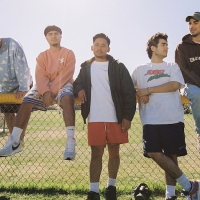 This year might be weird, but it won’t stop the glow up of Tkay MaidzaOn her latest EP, the Australian rapper evolves into a well-rounded mastermind teetering with international dominance.
This year might be weird, but it won’t stop the glow up of Tkay MaidzaOn her latest EP, the Australian rapper evolves into a well-rounded mastermind teetering with international dominance.

Aminé reaches a new peak with second(-ish) album, Limbo
On his second - or third, depending who you ask - album, the Portland rapper encapsulates a year of wins.
If you weren’t paying attention, Aminé’s glow-up might’ve come as a surprise.
For a while, the Portland rapper was somewhat of a cult figure in hip-hop’s new frontier, being an act synonymous with the genre’s versatile and experimental future. A lot of the talk surrounding him came from his break-out single Caroline - one that really encapsulated this genre-fleeting characteristic of the rapper - but even when people moved onto the next hit, Aminé wasn’t slowing down. Instead, he took to refining his craft, treating those who kept paying attention to gift after gift after gift; each one furthering Aminé’s craft and positioning him as a rapper synonymous with hip-hop’s future.
In 2018, however, things start to pick back up again. In Australia - tens of thousands of kilometres away from his US home - Aminé turned into one of the country’s biggest international rap favourites, finding similar frenzy to someone like Denzel Curry. His own work, shown through his 2018 mixtape / album ONEPOINTFIVE - it depends how you class it - pushed limits, while work as a go-to guest collaborator for artists such as Snakehips brought in new fans, many of which soon became attracted to Aminé’s craft. He was someone on the come-up - in a bigger way than ever before - and with no tendency to slow down, it’s clear Aminé was hitting his stride.
However, if ONEPOINTFIVE was Aminé finding his stride, then his new record Limbo sees the rapper take off with lightning speed, with a pace that won’t be caught up on for a long while. It’s Aminé well and truly finding his lane and dominating, presenting an all-time record that really solidifies his place in hip-hop, not just today, but also in what it looks like tomorrow.
It’s difficult to find a record like Limbo from a similar-sized rapper in the US. It’s rich with highs and lows; emotive peaks and valleys that even if there weren’t planned or meant to be received in that way, still feels like some of the year’s most potent hip-hop. Generally speaking, a lot of the album is rich with highs. Songs like Riri are destined for late nights and early mornings, while songs like Woodlawn are playful but fierce and focused. Pressure In My Palms - an album peak - is one of the best hip-hop songs of the year, featuring two rappers whose solo work could probably be argued as year-bests themselves: Vince Staples and slowthai (the latter of which's verse, unfortunately, is criminally short though).
However, there are other moments that feel a little darker, going deeper into the rapper and what’s become quite a turbulent year not just for Aminé, but those he represents - Black America, fellow rappers, and so on. Kobe - a forty-second skit central to the album’s first half - is heartbreakingly reflective; a spoken monologue that mourns Kobe Byrant while celebrating his contribution to realms even far beyond his basketball crown, intertwined with other moments across the record - Woodlawn and Fetus, which we’ll get to in a second - that mention Kobe and his everlasting influence to Aminé.
Fetus, meanwhile, doesn’t really seem like a heavy moment until you really think about it. It guest stars Injury Reserve, the hip-hop group who unfortunately lost one of their key members - Jordan Groggs - to an early death earlier this year. Fetus is one of the first songs to feature Groggs’ voice following his death, and his verse speaking of his late father and how he’s going to remain present for his daughter are some of the year’s most tear-jerking to hear. “Hope I can be half the father than my momma was,” he raps.
It’s an album that really pushes what hip-hop can be, and that’s something Aminé has always brought with his music. This time around, it feels a little deeper - a little more - and nothing quite summarises Aminé as someone always willing to take things further than what they have to be.
Follow Aminé: FACEBOOK
 This year might be weird, but it won’t stop the glow up of Tkay MaidzaOn her latest EP, the Australian rapper evolves into a well-rounded mastermind teetering with international dominance.
This year might be weird, but it won’t stop the glow up of Tkay MaidzaOn her latest EP, the Australian rapper evolves into a well-rounded mastermind teetering with international dominance.
 Meet Peach Tree Rascals, the multi-faceted collective who keep rising with I'm SorryThe genre-bending new stars are representative of a new-age DIY approach to music, and it's proving a lot of fun.
Meet Peach Tree Rascals, the multi-faceted collective who keep rising with I'm SorryThe genre-bending new stars are representative of a new-age DIY approach to music, and it's proving a lot of fun.